by Jenny Rose | Jun 7, 2018 | Aging, Connection & Community, Emotional Intelligence
Have you ever had a dream of finding an undiscovered room in a familiar house? I have, several times. I like those dreams. A large piece of furniture moves aside, or I walk into a room I know well and find a new door in it.
Last weekend, my partner and I went to our small local theater and I saw Book Club while he went happily off to Deadpool. (Honestly, I’m so tired of comics, superheroes, space adventures, special effects and unending battles and chases. Whew. It felt good to say that.)
The movie was a relief. I didn’t have to spend most of it with my eyes shut trying to filter out the entirely overstimulating and, at the same time, boring hyperactivity, and it wasn’t excellent. It didn’t require anything from me except to sit back and relax.
No spoilers and this is not a movie review, but Jane Fonda tries way too hard. Instead of marveling at her artificial youthfulness, I felt rather sorry for her. There was also a lot of unnecessary drinking. It didn’t add anything to the story. Some of the humor was more of a wince than a chuckle, but there were some truly funny moments. The writing was a little inconsistent. It’s a movie about connection and being an aging woman.
Overall, I could relate to these four women and I found the movie oddly touching in an unexpected way. I’ve been thinking about it ever since, in fact, trying to understand why it made me feel so bittersweet.
It has to do with giving up. Well, not really. Not giving up, exactly, but settling. No, that’s not quite right, either.
It has to do with gradually forgetting to entertain possibility.
That’s better.

Photo by Joshua Rawson-Harris on Unsplash
We inhabit our lives like a house. It’s a finite space, and we’re intimately familiar with the floorplan, the closets, the windows and the doors. Our house is defined by ourselves and the way we live, and it’s also defined by the external world and people around us. Outside our house is a world where all kinds of potential physical and emotional harm crouches, waiting for us to take a risk and leave our shelter. Outside our house is a wilderness of Unknown.
When we’re young the house of our life is new and exciting. We experiment using the space in different ways. We begin to figure out what we like and don’t like, what works well in our lives and what doesn’t, who we can live with and who we can’t live with. We gradually accumulate furniture in the forms of memories, scar tissue, hand-me-downs, beliefs, and new stuff we find all by ourselves.
The years go by and we learn a lot (hopefully) about the way the world works and who we are. We notice an ever-enlarging population of people younger than we are.
Then, one day, we’re in our fifties. Then our sixties. Then our parents are old. Not older. Old. How did that happen? Then our kids are as old as we were when we had them. It’s entirely disconcerting. We begin to think of ourselves as middle-aged and secretly feel older than that a lot of the time. Then, if you’re a woman, comes menopause, which, just as the onset of menstruation changed everything in the beginning of our lives, remodels our house.
For one thing, we need to tear out the heating system and replace it with cooling and fans.

Photo by Ian Espinosa on Unsplash
By this point in my own life, I’ve made a lot of choices and taken notes on how they worked out. I’ve made decisions about what I will and won’t do, and about what I am and am not interested in. I’ve decided what dreams to discard and interests to drop, because I’m out of time, energy or both. I’ve decided I know exactly who I am, what I’m capable of and what I need and want. I have an entirely private (because it’s shameful) list of things I’ve given up on.
Book Club speaks to the ways in which we begin to limit possibility as we age. In my case, it has nothing to do with age, though. I’ve been slamming doors behind me my whole life. When I was 18, I turned my back on high school. When I was 20, I left residential college, never to return. When I was 21 and got married, I gave up on dating or looking for love. When I was 27 and had my first child, I stopped dreaming of freedom and adventure.
And so on.
Of course deciding we’re never going to do something ever again practically guarantees the Gods will throw it back to us sooner or later, giggling. Now when I hear myself say, “Never again…” I can smile.
An even darker aspect of refusing possibility has to do with the dreams and desires we’ve never fulfilled. I’ve always struggled with financial scarcity. I tell myself nearly every day I’ll never be financially successful, and it doesn’t matter, because I have a good life, I have what I need, I’d rather have my self-respect and integrity than be rich (note the belief one can’t have both), and it’s not a big deal. I say all those things to myself because I don’t see any possibility of financial security. If I haven’t found it following all the rules and working so hard, then maybe I don’t deserve it, or it’s just not something I can earn or have. I don’t want to live the rest of my life hoping for something that never happens.
The story I tell myself is I’d love to find a great job where I could contribute my talents, do meaningful work, be part of a team and get adequately paid. I’m always watching and listening for that job. But I know I’m too old, the things I love to do will never pay well, the kind of thing I’m looking for wouldn’t be here in rural Maine, and I’ll struggle to maintain adequate housing and feed myself forever.
If there’s no possibility, I can work on accepting what is and try to be peaceful.

Photo by Nathan Dumlao on Unsplash
Book Club was redemptive. It reminded me possibility still exists for me. I’ve done things in the last five years I never imagined doing in my wildest dreams. Why do I think it’s all over now? Why do I make so many iron-clad assumptions about the size and shape of my house? Why am I deliberately trying to ditch my dreams? Why do I think of myself as a food item on the pantry shelf with an expired sell-by date?
Am I too old and jaded to invite miracles? Am I too worn out to move a piece of furniture (a bookcase, what else?) and discover a door behind it I never saw before? I know I’ve yet to discover my highest potential.
Maybe I’m just not very brave. I don’t want to fail anymore. I don’t want to be disappointed or feel I’m a disappointment, ever again. I don’t want to be let down, or hurt, or stood up or rejected. I don’t want to look like a fool. (I don’t mind being a fool, but I don’t want to look like one.) I don’t want to be scared.
I don’t want to play power games with people.
Perhaps this is the crust of old age, this gradual accumulation of weariness, scar tissue, limiting beliefs, and physical changes that keeps us sitting in our familiar, safe house, where the edges and boundaries are well-defined and unchanging and we control the dangers of possibility.
Some people successfully shut out life, or shut themselves away from it. I’m never (there I go again) going to be able to pull that off, though. I’m too curious and too interested. An overheard remark, a movie, a conversation, a book or even a song lyric invariably comes along and kicks me back into motion when I’m threatening to lock myself permanently in the predictability and safety of my house. Then I begin to write, and the walls waver and shimmer, new doors and windows appear, a corner of the roof peels away to show me the sky, and I remember I’m still alive, still kicking, still wanting and needing and still, in spite of my best efforts, dreaming of possibilities.
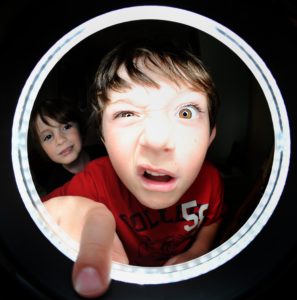
Photo by frank mckenna on Unsplash
All content on this site ©2018
Jennifer Rose
except where otherwise noted
by Jenny Rose | Mar 8, 2018 | Choice, Power
Selchie: A mystical creature who takes the form of a seal in the sea and a human on land.
I have a picture book from my childhood called Greyling, by Jane Yolen. It’s one of my favorite stories, by one of my favorite authors, and I’ve told it as an oral storyteller for many years. When I began doing storytelling, I sought out all the selchie stories I could find and incorporated them into my programs.
I rarely tell a selchie story without fighting back tears.
I’ve lately revisited this wonderful material for the second book in my Webbd Wheel series, and it occurred to me to explore why these stories touch me so painfully and deeply.
Selchie stories appear in the Hebrides, Iceland, Orkney, Scotland, Ireland and the Faroe and Shetland Islands. Like all lasting oral traditions, they contain blueprints for navigating loneliness, exile, love, loss, competition, compassion, trust and power. A good story has many facets.
A common thread in selchie stories is that a seal comes to land, takes off its skin, and becomes human, usually a beautiful young woman. Subsequently, the skin is stolen by a man and the woman entrapped. In many of the tales, she marries the man who has her skin (always a fisherman) and bears his children. Sometimes her husband promises after a certain number of years he’ll allow her access to her skin again, but he doesn’t follow through for fear of losing her. Inevitably, the skin is found, often by a child, and returned to the selchie, who must then face a choice between her life with her family and her life in the sea.

Photo by Jeremy Bishop on Unsplash
It is this choice that makes me weep. I know the agonized longing for what we are made of but can’t ever quite find.
As I observe the world and people around me, I think many of us feel in some way exiled from who we were born to be, from a place, from a tribal connection, from some integral expression of self. I believe this exile creates such an unbearable hunger we grasp at anything within our reach in order to appease it, becoming addicts, developing eating disorders and body dysmorphism, and struggling with anxiety and depression. We live in a culture of distraction and entertainment. We’re busy, noisy, exhausted, and inundated with information, stimulation, propaganda, manipulation and demands.

Photo by Anna Dziubinska on Unsplash
We want what we are made of, but how do we find what that is? Why is it taken away or withheld from us? Why are we so often forced to choose between one thing we’re made of and another? This all lies at the heart of selchie stories, for the selchie is a creature torn between two worlds and two tribes, and we instinctively recognize this conflict.
Choice is so often grief. If a selchie re-dons her skin and goes back to the sea, she cannot return, for she already knows the terrible cost of losing her skin, and though she may love her children and even have grown to love the fisherman she’s with, she cannot trust him. In returning to the sea, she is joyous, but now the grief of leaving her children and the life she made on the land replaces her longing for the sea.
I was with a man who avoided choice. He said he didn’t like to choose one thing in case something better came along. My experience of this was that he didn’t want to commit. It meant we couldn’t plan a date, a weekly ritual or even a walk. If we did, he frequently cancelled at the last minute. It was painful for me, and it frayed our connection considerably as I vacillated between hurt and anger. Eventually, I gave up and made my own plans. I told him that his maybe-I-will and maybe-I-won’t approach didn’t avoid a choice but was a choice. He refused to take responsibility for that, and he was bitter about the choices I made subsequent to his.
I’ve also been with partners who believe we can have it all. One man walked away from any situation in which he couldn’t have his cake and eat it too. It was a point of pride with him. He didn’t see why he shouldn’t have it all, and, as far as he was concerned, the world (and I) owed him that. Looking back, I see this as just another evasion of the heartbreak and consequences of having to make choices.
I think very few of us have the luxury of having it all. We come together and move apart, searching, fleeing and climbing ladders we hope end in success. Many of us feel rootless in terms of place and tribe. We don’t really feel we belong anywhere on a map, and we have no rightful place in a human circle. We do the best we can, a choice at a time, and over the years those choices and their consequences teach us who we are and turn us into adults.
What we’re made of is not necessarily what we’re born into. What we’re made of is not necessarily the place we live in, the people surrounding us, the job we have, the clothes we wear, the car we drive or the color we dye our hair. What we’re made of is not always who we want to be, who we insist we are or who we’re expected to be. Discovering what we’re made of is an excavation of our dreams, our souls and our joyous bodies. Many of us spend our whole lives finding one piece of ourselves at a time, stumbling, groping, picking up and discarding, searching blindly in the dark with nothing but our feelings to guide us.
On one particular day of no special consequence, my small toddling self, clothed in a yellow bathing suit with white trim, was lifted into a pool of water as big as the sea. From that day to this I’ve loved the water, and during occasional long, dry spells without access to swimming I dream of water and wake myself weeping with the anguish of my longing.
I’m a creature of water. It’s part of what I’m made of.
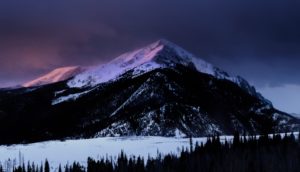
Photo by Nathan Anderson on Unsplash
For some years I lived in a city and laid awake at night watching headlights move across the ceiling and walls, straining to hear a precious moment of silence in between the sound of cars and sirens and too many restless people moving through the pale night. I dreamed of high, snow-covered mountains under starry skies and the peace of trees in unbroken darkness. Every day I died a little more, but I knew in my heart one day, one day I would leave the city and live in the shadow of the mountains I dreamed of. A thousand nights later I freed myself from the tentacles of that city, but I also left behind my marriage and the father of my children, my belief in happy-ever-after, the most lucrative job I ever had and the good wife and mother I wanted so much and tried so hard to be.
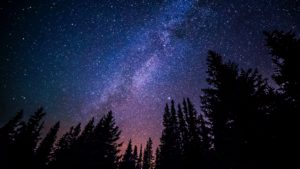
Photo by Ryan Hutton on Unsplash
At last, I slept in the shadow of snow-covered peaks in a small mountain town without pavement and street lamps and sirens. When I awoke at night, I heard the cry of the vixen, the rushing wind, the owls calling to one another, the sound of the bear eating apples from the tree outside my window, or the raccoons cavorting in the tops of the pear trees like furry pirates.
I did not have it all. I had another piece of what I’m made of. I chose it, and I paid for it. I’m still paying for it, twenty years and thousands of miles later, and whatever the cost, it’s worth it. I cannot live in the city.
By the time my life is over, will I know everything I’m made of? Will I have lived with enough courage to choose what I’m made of, come what may? Will living true to what I’m made of sustain me? Will I ever find my own sealskin wedged between rocks, or locked away in a chest, or hidden in the thatch?
Reclaiming what I’m made of, one choice at a time. My daily crime.
The selchie lives in a small cottage on the shingle beside the sea. She lives with a fisherman whose face is carved with a lifetime of loneliness that she has relieved. She and her children gather seaweed and driftwood, mend nets and dry fish and watch for the fisherman’s return, lighting a lamp and setting it in the window to welcome him home in the evenings. She lies with her man at night and listens to him sleep, and the waves come in, and the wind sighs through the beach grass, and she thinks of her sea kin and wonders how it is with them and if she’ll ever see them again.
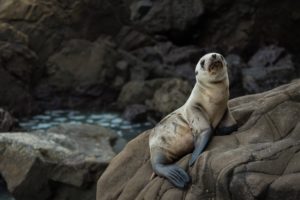
Photo by Kace Rodriguez on Unsplash
The selchie takes the folded sealskin from her child and holds it to her breast, weeping, smelling its fading perfume of fish and sea, rubbing its softness against her cheek. She tells her children she loves them, but she must leave, and they clutch at her hands and her skirts, crying, not understanding what is happening. She tells them they will see her again, but in a different form. She cannot stop to explain, lest the fisherman return and her chance for freedom is lost. She stumbles out of the house, casting aside her clothing as she goes, until she stands naked in the surf and steps into the skin. The children follow, stricken and wailing, pleading with her not to leave, but her need for what she is made of is even greater than her love for them, and the surf takes her gladly in its embrace and carries her out. She looks back one more time, her great, dark eyes full of tears, before she dives into the arms of what she is made of and disappears.
All content on this site ©2018
Jennifer Rose
except where otherwise noted
by Jenny Rose | Feb 22, 2018 | Choice, Power
A small clay sculpture of a woman with her hands cupped in front of her chest sits on my desk. She holds a tiny clay bird and is surrounded by a couple of crystals, a piece of amethyst and a small geode. This little altar has been my daily companion for years. Wise and smiling, round and nurturing, the sculpture has comforted me through many losses, grief and rage. She’s one of my greatest treasures.
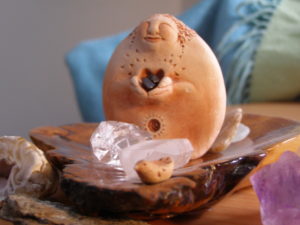
Letting Go
These days, the bird she holds is perched on the rim of the wooden dish she sits on, looking out at the room, at the world, at me. It can stay, or it can fly away. For now, it’s content to sit, watching and listening, as I live my life in these two small rooms at the top of our sagging farmhouse.
I have placed tiny polished garnets in the woman’s cupped hands where the bird once nestled.
I had a friend, dear and wise, in my old place who once said to me if we open our hands and let something go, and keep our hands open, something new will come and fill them. As she spoke, I again saw the image of an open hand, generous, allowing freedom, and prepared to welcome and support the next thing, and the next.
Letting go is power. Letting go is serenity. Letting go is an authentic act of love toward self and others. The usefulness of letting go is not a secret. Almost any self-help book out there talks about it as an aspect of healthy functioning, but I think popular psychology doesn’t explore it deeply enough.
Letting go doesn’t mean we brush aside our feelings. Not at all. Unexpressed feelings cement us in place. We all know people who remain frozen in time because of a death or traumatic event. Years and decades pass, but they don’t heal. They don’t move on. Their emotional growth is arrested. This is what unfinished emotional business looks like. Unexpressed feelings can’t flow through us and dissipate so we can release them.
We know very little about appropriately expressing our feelings in this culture.
Feelings aren’t thoughts. They’re not stories, expectations, beliefs or ideology. They’re not labels or rules. Like it or not, admit it or not, we’re physiologically wired for feelings, and they give us good information about how things are with us. Our thoughts and beliefs, on the other hand, are frequently distorted, confused, misinformed, outdated or otherwise unreliable.
That’s where letting go comes in.
We’ve all had events in our life that left deep scars. We’ve all seen things we can’t unsee, heard things we can’t unhear and done things we can’t undo. We’ve all felt disempowered or victimized at one time or another. Death and disaster enter our lives with no warning and take those we love.
Some people move on from such events with more grace than others. I suspect part of that grace has to do with forgiveness. Not forgetfulness, but forgiveness of self and others. I suspect another part is the ability to fully experience and express the feelings attached to the event. That requires a certain kind of support, and many folks don’t have it. Some people simply don’t choose to move on or let go. They center their thoughts, feelings and energy in the event, whatever it was, and they hold it tight, cherishing it, feeding the fire of their pain, keeping their scars open with the razor blade of their attention and focus. It becomes part of their identity, part of their story, a grievance to cling to, a betrayal to treasure, a wound to worship.
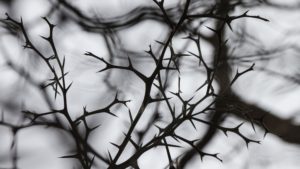
Photo by Andrey Grinkevich on Unsplash
I have a book called Clean Sweep, by Denny Sargent. It’s filled with rituals and instructions to help us let go of what no longer serves us. The author outlines a banishing exercise in which he suggests the reader visualize holding tightly to a thorny branch. In my own version, the branch is heavy, so heavy I can hardly hold it, which drives the thorns deeply into my flesh. The branch is a person, event, memory or belief that gives us emotional pain. We can make an easy choice and cling to it, cradle it, embrace it, let it tear our skin and make us bleed. We can make a harder choice and set it down, open our hands and let it fall. We can walk away from it. We can burn it or bury it.
In order to let go, we have to be willing to surrender control and endure loss. Letting go of a core piece of identity, a long-held belief or a painful memory is difficult work, even when that core piece, belief or memory gives us great pain. Letting go will leave a hole. Then what? Then who are we? How do we fill that hole? How do we understand ourselves and our place in the world? This is scary stuff.
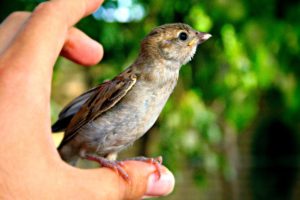
Photo by a-shuhani on Unsplash
Aristotle said nature abhors a vacuum. My friend was right. If we open our hand and release what we’re holding, something else will come, though we can’t predict or control what it might be. In fact, the thing released might return to us in another form. We can’t know. We’ll never know unless we release our need to control. We’ll never find out what might perch on our open hand if we’re not willing to walk through loss in order to reach gain.
I’m having a long and involved break up with my desire to control. Some days I go all day without thinking about it, and other days I want to micromanage everyone and everything in my life. Some days I feel light and free, a confident and lovely woman, and other days I feel like a grubby three-year-old hiding under the covers sucking my thumb because nothing and no one is the way I want them to be. I sulk and pout and snarl and I feel crushed by the thorny weight of my need to control.
Then, at some point, my eye falls on my little clay wise woman and her cupped hands and wide-open heart, and I say, “Oh, yeah. That’s right. Letting go.”
I feel annoyed when people tell me to “get over it.” First of all, I have a right to my feelings, and secondly, it’s not that easy. Letting go, for me, is a practice, and I need time to engage in it. Sometimes I go back and find my leaden armful of hawthorn or bramble or locust and hold it again for a while, opening up all the old wounds, exhausting myself, hurting myself, and, finally, opening my hands and letting it fall again. Sometimes I need to design a ritual for letting go, a prayer or a dance or some kind of purification rite. Sometimes I need to make a physical resting place, like a grave or a patch of garden or a newly-planted tree in order to let something go. For me, taking time to honor whatever it is I’m trying to release is helpful. Whatever it is that no longer serves, it was once a part of my life and experience. Laying things to rest in this way helps me release them fully and finally.
When it comes right down to it, this blog has been an exercise in letting go as much as anything else.
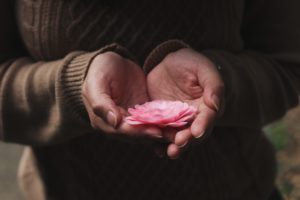
Photo by Ester Marie Doysabas on Unsplash
When we know how to let go, we increase our power, as well as the power of others. Often, what we desperately hold onto is people. This is a strong archetype in old stories; locking the beautiful maiden in the stone tower to “protect” her. Part of love, as any seasoned parent will tell you, is letting go. Imprisoning, disempowering and trying to control others isn’t love. Refusing to let go of someone isn’t love.
Releasing our grievances with others frees them as well as ourselves. Being willing to accept an apology, an explanation, and the imperfections of others allows us all to move forward with lighter loads. The stories and memories we hurt ourselves with are often ghosts, events involving people who are long dead and far in the past. We can choose to bless them and lay them to rest.
I don’t want to haul around painful memories, toxic garbage, the futility of trying to control life and ineffective behaviors and beliefs. I can’t swim with all that tied to my ankle. I can’t dance. I can’t embrace anything or anyone with an armful of brambles. I can’t create with a heart full of thorns.
I want to be free.
I open my hands.

Photo by Stephen Leonardi on Unsplash
Make a Boat
Make a boat
out of who you are
not what you have.
If you don’t know who you are
(Search for the desert between the worlds.
Find Bone Mother.
Recollect.
Reassemble.
Bathe in soul.
Birth yourself.)
That is another journey.
Your boat will be small.
You can take no one.
You can take no thing.
Shape your boat with your truth.
Shape it with the joy in your hands
and the wisdom in the soles of your feet.
Make a chisel of rage and grief.
Sand with the grit of clarity.
Stain with blood.
Oil your boat with the moisture and musk of your sex.
Stitch the rags of your life into a sail.
Weave rope from your hair.
Take your time
And remember
Fear does not float.
When you know the boat is ready,
Sit in it.
Lay the backs of your hands on your knees.
Open your hands.
Let everything go.
Let everything go.
Keep your hands open
So that new things may come.
Without fear
Ask the one who stands just behind your shoulder
The one who shelters your life in the shadow of her wing
To come forward.
She will guide the boat.
Surrender yourself to your boat,
to the water,
to your guide.
Find your breath.
Stay there.
Find your heartbeat.
Stay there.
Keep your hands open.
Rest.
Don’t stand up in the boat!
Don’t throw yourself out of the boat!
Don’t you want to see where you are going?
Look. See how the feathers on her wing
trail in the water?
All content on this site ©2018
Jennifer Rose
except where otherwise noted
by Jenny Rose | Feb 8, 2018 | A Flourishing Woman, Mind
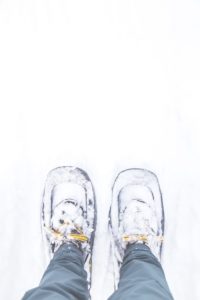
Photo by Dakota Corbin on Unsplash
In the mornings now, I strap on my snowshoes and go down to the river. This is the first time I’ve ever snowshoed, and when I began a few weeks ago I anticipated moving silently and gracefully (as opposed to floundering like a pregnant hippopotamus) through the landscape, seeing the animals that make the tracks rather than just the tracks themselves.
It was a lovely vision.
The reality is that cycles of snow, sun, rain and subzero weather do not create a fluffy blanket on the ground, but a crusty, layered mix of wind-hardened drifts; thick, lumpy ice; and bitter frozen ground. Walking on it, I feel exactly like Sasquatch, lurching and loud. CRUNCH, crunch, crunch, and then CRUNCH and wallow, wallow, wallow and giggle, swear, giggle. If one fails to lift the tip of a snowshoe up far enough, it catches under the top crust and down one goes on hands and knees, thrashing in several inches of cold, grainy powder to regain a standing position and some kind of solidity underfoot. The only wildlife I see is a squirrel or a pileated woodpecker observing me from a high perch, alternately laughing scornfully and scolding.
So much for romance.
My partner and I walk gingerly out to the mailbox or car on the glassy ice in the driveway, taking tiny, tentative steps and testing each before going on. Somewhere, under all that ice, lies a sleeping world of earth, grass, clover and the inhabitants of the soil. I wonder, do they know this very minute more snow is falling on the layer of ice above them? Do they hear our footsteps slipping and sliding, or the click of the crampons we use on our boots or on the bottom of the snowshoes? Do the delicate weights of the juncos eating sunflower seeds off the ground or the footprints of the squirrels as they race from tree to tree, foraging and playing, reach the world beneath the winter skin of ice?
When I arrived at the pool to swim yesterday, an exuberant group of adolescent boys was in the water, shooting balls through a hoop. In a nearby lap lane, I settled down into my usual steady Zen freestyle, letting my mind drift from this week’s blog post to the day’s writing and all points in between. The sun shone in a row of windows alongside the pool, so I swam through alternating bars of shade and light.
Above the skin of water, the boys shouted, yelled, laughed and talked, jumping and splashing, filling the air with the echoing noise characteristic of indoor pools, along with the slap and slosh of agitated water and the sound of balls bouncing off the rim of the hoop or the tiled floor around the pool.

Photo by Jeremy Bishop on Unsplash
Under the water, I entered a different world, a silent world of rippled turquoise light and blue water. As I swam through intermittent sunlight, my shadow reached its arm toward my fleshy arm as I stroked, the two sets of fingers trying to touch. The agitated water rocked me so I had to turn my head farther when I breathed in order to avoid a mouthful of chlorinated pool, but the noise from the world above sounded far-off and muted, nothing but a background for my own thoughts. I didn’t notice when the boys exited the pool and I was alone with the ripples of light and the steady stretch, pull, breathe and kick of my body.
Under the snow lying over the meadows and fields on this land is a world of field mice, shrews and other small creatures. They run through tunnels of last season’s decaying growth, foraging, sleeping, mating, fighting and living their lives. What do they think as I pass over them, a giant in snowshoes on sharp teeth? Do they crouch and cower in terror, or do they feel secure under the thick skin of snow? They surely must mark my passage, but their presence escapes me entirely. Does my weight cave in their tunnels and storerooms? When I fall through the crust am I laying waste to whole communities hidden beneath the snow? Do my footprints provide hunters from worlds above easier access to prey living in the layers below?
In the old tales, heros and fools, youngest sons and tricksters descend. They fall into dreams and oceans, enter wells and caves, go through trapdoors in the floor, climb down beanstalks and step down stairs. They crawl down chimneys or disappear in the red maw of a wolf or the cavernous insides of a whale. They brave cellars and tunnels and dungeons. They find worlds of magic, of mystery, of intuition and wisdom and hidden treasure.
In a lifetime, we travel from the darkness of the womb into the light and back into darkness again. Our experience is layer upon layer of minutes, hours and years. Beneath our skin, hidden in the folds of our exquisite and mysterious brains, are all the things we’ve seen and heard and felt, all the events that have shaped us. Beneath the membrane of our cells is our genetic code, the building blocks from which we are made.
Beneath, and beneath, and beneath.
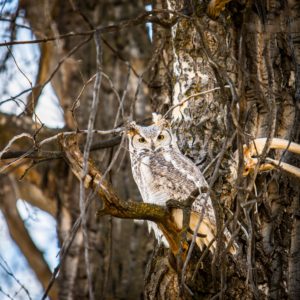
Photo by Laterjay Photography on Unsplash
The worlds beneath support the worlds above. If the soil does not contain the right mix of microbes, minerals and nutrients, trees will not grow. If the rodents leave our fields for quieter places where Sasquatch is not roaming over their heads, the fox cannot survive here. Without both healthy trees and rodents, the owls hidden in plain sight in the tops of the winter trees will starve.
Yesterday I wrote a scene in which I wanted hedgehogs. I paused my writing and turned to the Internet to research. For two hours, I read about hedgehogs, looked at images, listened to audio recordings of their sounds. Now the section is written, the hedgehogs only a small part of the whole, and the vast majority of facts and observations I collected will never appear in the book. They lie beneath the words. No matter. That research, my delight in these small creatures and their private lives, will enliven and enrich the story, even if invisible to the reader.

Photo by Tadeusz Lakota on Unsplash
What lies beneath my skin and yours? What’s concealed beneath the skin of ice, of water, of rock, of soil, of forest and meadow and swamp? What can we learn from those who know how to travel from one layer, one world, to another? How far might we descend, or, for that matter, ascend?
Peering beneath the skin. My daily crime.
All content on this site ©2018
Jennifer Rose
except where otherwise noted
by Jenny Rose | Dec 14, 2017 | Authenticity, Emotional Intelligence, Needs
It occurred to me this morning that, in general, I’m still confused about what I want.
I’ve had a tumultuous history with my own wants. At some point, very early, as I was learning to be a people pleaser, I gave up wanting anything because I thought it was bad. What I understood was that everyone else’s wants were far more important, and it was my more-than-full-time job to provide those wants rather than selfishly have my own. With rare exceptions, that’s been my modus operandi my whole life.
When I went through a life coaching and emotional intelligence program, my coach suggested I had a perfect right to get my needs met, and he defined some of my “wants” as needs, for example my longing for community and connection. I was enraged. Nobody had ever before made such an outrageous proposal. He clearly didn’t understand the terrible vulnerability of needing or wanting anything from anyone. Having the right to get needs and wants met was the most ludicrous, dangerous piece of heresy I’d ever heard.
That was four years ago, and I’m as angry about it now as I was the first time I heard it.
I also can’t leave the idea alone. I think about it all the time.

Photo by John Salvino on Unsplash
I picture my needs and wants as a snarling chained wolf with blazing eyes, nothing but matted grey hair over bones, backed into a tight corner, determined to go down fighting.
I grieve, literally, to admit I chained it there myself. I chained it without food, water or shelter, and walked away — for decades. During those years of neglect, it starved and thirsted. It suffered alone with no help, no hope, a solitary prisoner.
I’ve done a lot of animal rescue work in my time, and I know sometimes an animal is just too far gone to rehabilitate. Sometimes you can save their bodies, but the abuse and neglect they’ve suffered has damaged their will to live and their ability to trust and connect, and rescue comes too late. Sometimes, against all odds, some strength of heart or spirit survives and an animal accepts affection and care, but its body is too starved or broken to heal.
Part of what I’ve been doing since I’ve come to Maine is to try to rescue my chained wolf, this piece of self I rejected, denied and tried to destroy.
It’s a long process, filled with grief, shame and anger. It takes determination, patience, and the willingness to own my history, my pain and my choices, as well as consenting to my responsibility for my own self-healing. Overcoming internal taboos is desperately hard work, and Wanting is one of my oldest taboos.
Sometime last year I wrote a list titled “Things to Want.” It was short and consisted of necessities, mostly. After a lot of hesitation, I added two things that were not necessary but I just … wanted. It felt wrong. It felt shameful. I left the list on my desk and over the following days and weeks I looked at it as I went about my life. About eight months later I bought one of the unnecessary things, a perfumed body oil I love. It cost about $25.
It was like offering a little bit of bland food to my starving wolf, pushing it near with a stick so as to avoid getting mauled. Not so much food as to make it sick, but a place to start.
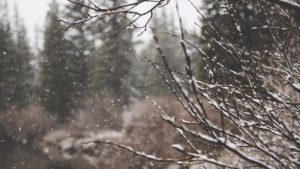
Photo by Arun Kuchibhotla on Unsplash
This morning, in the pause of winter and our first big snowstorm, my partner and I talked about our plans, our dreams, and our progress. Later, I went out to walk in the snow and I suddenly saw another layer to wanting, another step closer to making amends to my chained wolf.
Wanting is just the beginning. Making a Christmas list is only the top step. What’s the list under the Christmas list, and the list under that? What is it I really want, independent of anyone else? What about the dreams I hold in common with no one, that are just about and for me? If I was free — If my wolf could bound through the snowy landscape and disappear into the Yule forest — what would I want? If we could escape judgement, our own and others’; escape for a moment our stories and labels and self-definitions; escape family, social and tribal expectations; escape our ideology (most imprisoning of all) and want, honestly, nakedly, with all our hearts, what would that Christmas list look like?
In other words, it’s not about the perfumed body oil (Aphrodisian Fire, by the way, from Kate’s Magik). It’s about touch, scent and caring for my thinning skin. It’s about deliberately honoring my own feminine sensuality.
I don’t need any particular product, cosmetic, clothing, gizmo or piece of technology in order to honor my own feminine sensuality, although there are plenty of things to buy that might support that want, including Aphrodisian Fire, but I see now those are really just symbols. I have the power to honor my sensuality in the way I live — in the choices I make about who I connect with and how, and how I treat myself.

Photo by Caley Dimmock on Unsplash
Santa hasn’t got my choices in his sleigh.
I’m very attached to the dreams my partner and I hold in common. I love our vision, and I’m invested in it. It’s going to take a lot of money, and we don’t have that right now.
Maybe we won’t ever have it.
Maybe I was a damn fool (again) and I should never, never, have listened to someone who says it’s okay to have needs and want them met. Maybe I should walk away from my wolf again, and this time never come back. Let it starve to death.
But maybe our grand vision and plans are only the top layers of what I really want. Maybe the plan is the wrapping paper around the real treasures of self-reliance; living as part of a complex, self-sustaining system; building independence from the energy grid and a culture I largely can’t support; fostering community and trusting in my greatest joy … writing.
I don’t have to wait for the plan to happen to have those things. I don’t need money. I don’t need to wait for someone else. I don’t need to brutally imprison or eliminate my wants and needs. I can be learning, building and transforming my life right now, today, from the inside out. I can, day by day, draw a step closer to my wolf with food, with water, with a gentle hand and with compassion, and maybe, one day, come close enough to remove the chain and let the poor creature go free and wild into the world, wanting and needing as it will.
So, I’m making a list and checking it twice. Or three times. I’m peering underneath the items, things, objects, stuff on that list. What is it I really want? What am I really longing for? And if I look under that, what do I find? What are the deepest wants and needs?
Merry Christmas, everyone.

Photo by Galina N on Unsplash
All content on this site ©2017
Jennifer Rose
except where otherwise noted





















